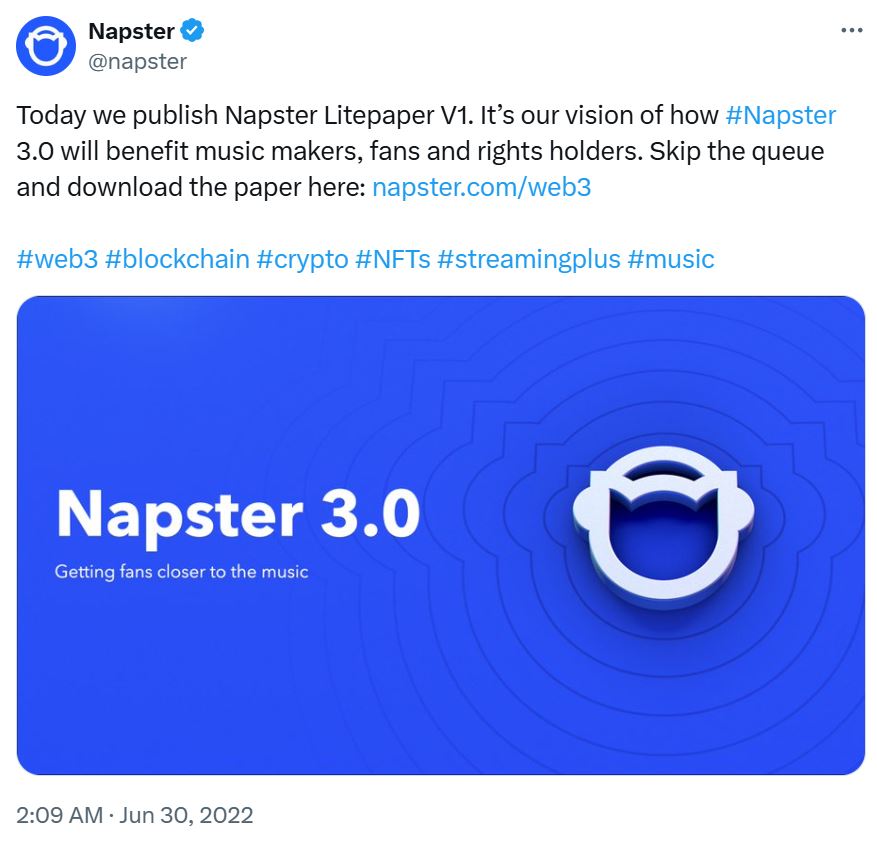In a significant move in the worlds of music and technology, the artificial intelligence startup Infinite Reality has officially acquired the renowned music streaming service Napster for a whopping 7 million. This acquisition aims to transform Napster into a pioneering platform within the music-focused metaverse, promising immersive experiences for users around the globe.
On March 25, Infinite Reality announced its vision for the newly acquired Napster, which includes the introduction of “branded 3D virtual spaces.” These unique environments are set to host virtual concerts and interactive “social listening parties,” offering fans a chance to engage with their favorite artists and access exclusive merchandise directly within this evolving digital landscape. Napster’s CEO Jon Vlassopulos will continue to lead the brand, emphasizing the transition into what he describes as the “immersive era” of the internet.
“Imagine stepping into a virtual venue to watch an exclusive show with friends, chat with your favorite artist in their own virtual hangout as they drop their new single, and be able to directly buy their exclusive digital and physical merch,” said Vlassopulos.
This acquisition not only seeks to revive the legendary Napster brand—known for its controversial roots in music piracy—but also aims to empower artists with innovative tools for audience monetization and engagement. Infinite Reality plans to incorporate AI-driven customer management agents and analytics dashboards to help musicians better understand fan behavior, potentially revolutionizing how artists connect with their audiences.
Napster’s history is noteworthy; it was initially launched in 1999 as a peer-to-peer (P2P) file-sharing platform before being forced to shut down in 2001 due to copyright infringement lawsuits. Despite its tumultuous past and several ownership changes—including its more recent transformations into a music streaming service—Napster continues to reinvent itself. The company briefly explored the Web3 space with plans to launch its own token for purchasing music subscriptions while acquiring a Web3 music startup, Mint Songs, earlier this year.
As Infinite Reality prepares to finalize the acquisition in the coming weeks, the company aspires to evolve Napster into a leading immersive music platform that bridges the gap between artists and fans in an increasingly digital world.
Infinite Reality Acquires Napster for a New Era in Music Streaming
This acquisition signals a transformative shift in the music industry that could redefine how fans interact with artists and experience music. Here are the key points from the merger:
- Acquisition Details:
- Infinite Reality has acquired Napster for 7 million.
- The acquisition aims to expand Napster’s services into a music-focused metaverse.
- Innovative Features:
- Plans to introduce branded 3D virtual spaces for events like virtual concerts.
- Functionality for social listening parties and direct sales of virtual merchandise.
- Users can engage with their favorite artists in virtual hangouts.
- Impact on Artists:
- Empower artists with new monetization capabilities.
- Usage of AI tools for community management and analytics.
- Enhanced ability to track fan behavior for better engagement strategies.
- Historical Context:
- Napster was originally launched in 1999 as a peer-to-peer music-sharing service.
- The brand faced legal challenges and underwent several ownership changes before the acquisition.
- Future Vision:
- Transitioning from a 2D web experience to a more immersive 3D environment.
- Striving to become the leading immersive music platform for artists and fans.
“Imagine stepping into a virtual venue to watch an exclusive show with friends…and be able to directly buy their exclusive digital and physical merch.” – Jon Vlassopulos, CEO of Napster
This acquisition may evolve how users engage with music, potentially affecting how they discover and share content, purchase merchandise, and participate in events. Artists might find new ways to monetize their work, while fans may experience a more interactive and personalized music environment.
Infinite Reality’s Bold Move with Napster: A New Era in Music Streaming
The recent acquisition of Napster by Infinite Reality marks a significant development in the evolution of music streaming and virtual experiences. By investing 7 million, Infinite Reality aims to transform the once-infamous music-pirating app into a vibrant music-centric metaverse. This strategic move capitalizes on emerging trends in immersive technology and social interaction, potentially appealing to a wide array of stakeholders, from artists to fans and industry professionals.
Competitive Advantages: One of the standout features of this acquisition is the transition towards branded 3D virtual spaces. Infinite Reality’s vision of hosting virtual concerts and social listening parties positions Napster as a frontrunner in combining the music industry with the metaverse. This innovative approach offers musicians unique opportunities to engage with their audiences in real-time, creating a more personalized and memorable experience. With advanced features like AI-driven fan engagement tools and analytics, artists will be empowered to understand and monetize their audience better than ever before.
Moreover, the commitment to integrate virtual merchandise and exclusive content will likely pique the interest of both established musicians and emerging talent. Fans will not only enjoy immersive experiences but also the added perk of purchasing exclusive digital and physical merchandise during virtual events, thus generating additional revenue streams for artists.
Challenges and Drawbacks: However, this ambitious undertaking is not without its challenges. Napster’s complex history, from its peak as a pioneering music platform to its downfall amidst legal battles, may create skepticism among potential users and investors alike. The brand’s previous struggles with copyright infringement may also deter some musicians who are cautious about aligning with a service that was once synonymous with music piracy.
Additionally, while the concept of a music-focused metaverse is exciting, it also presents significant technological challenges. The success of virtual concerts and engagement relies heavily on user acceptance and the widespread use of augmented and virtual reality devices, which are still on the horizon for mass adoption. If the technology doesn’t catch on as anticipated, the platform may fail to attract the critical mass needed for sustainability.
Who Stands to Gain or Lose: At the heart of this acquisition are artists craving new methods to connect with fans. Musicians looking for innovative monetization strategies could find Infinite Reality’s offerings beneficial, especially in an era where traditional revenue avenues are dwindling. However, for those who remain skeptical of technology and its place in music, or for fans who prefer a more traditional streaming experience, this bold venture may seem more like a gimmick than a genuine opportunity.
In summary, while Infinite Reality’s acquisition of Napster signals a promising leap into the future of music engagement, the real test will lie in execution and user acceptance in this rapidly evolving digital landscape.

















